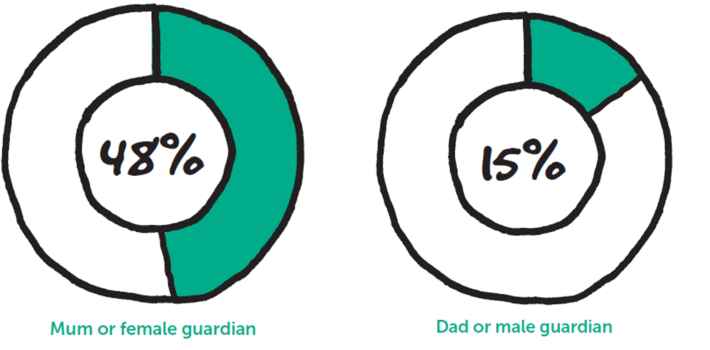A special note to fathers

Talking with Dad
In the past, many dads did not talk to their kids about sex and relationships.
WA teens are still half as likely to use their fathers as a source of information compared to their mothers.10
Percentage of WA teens who ever spoke to a parent about sexual health:

Gender stereotypes
Gendered double standards are still common – only girls should talk about periods, boys aren't able to control their sexual urges, girls should be solely responsible for contraception, girls wearing certain clothing makes them 'responsible' for being harassed or assaulted, girls should say no.
When dads don't talk to their kids (both sons and daughters) about sex it continues the cycle of young men feeling ill-equipped to talk about intimate issues.
Worse still, it runs the risk of confirming stereotypes that boys and men bear no sexual responsibility, such as 'they can't help themselves' or 'boys will be boys'.
Where to start
Dad's need to take the lead and show that they are open to having these conversations.10
If you haven't started talking to your kids from a young age, it can be daunting to make a start.
If you're feeling uncomfortable, it won't hurt to acknowledge this by something like:
"I'm not sure what to say, but I think it is really important that we can talk about this. When I was a boy the only thing I knew about girls/puberty/sex was...".
What you can do to help

- Start when the kids are really young so that you both get used to it.
- Pick the bits that you do feel comfortable talking about and find books for the bits that you don't.
- If you are a single parent, decide with your child on another adult your child can go to with questions or for a different perspective.
- Kids want to know about your values and beliefs, not just about periods and wet dreams.
- Tell them how you think people should treat each other in relationships such as being valued and respected, respecting each other's boundaries and the importance of consent.
Read next:
If you would like some support:
Ngala Parenting Line, Parenting WA
You might also be interested in:
For goodness sex: changing the way we talk to teens about sexuality, values and health, by Al Vernacchio (USA) Sex education for parents and teens promoting healthy sexuality, values and body image in young people.